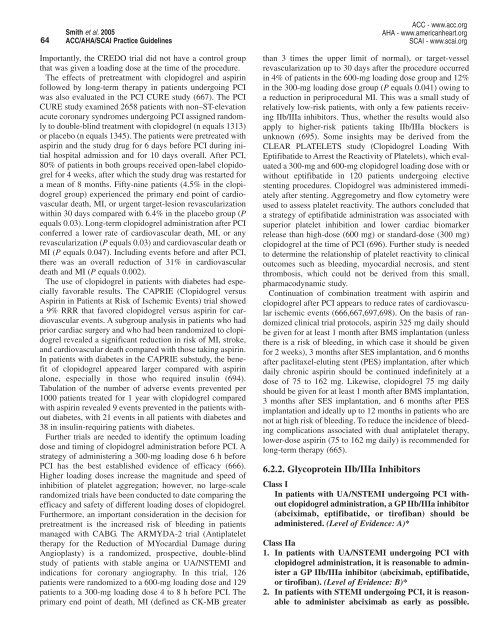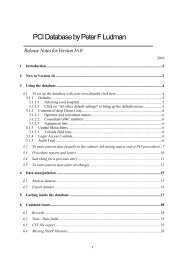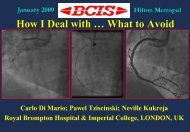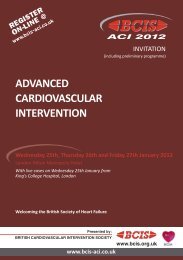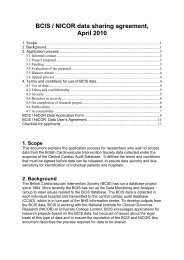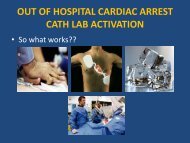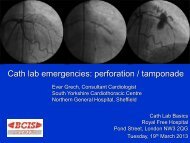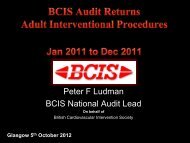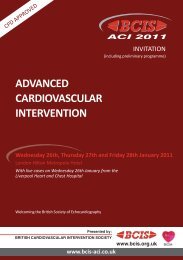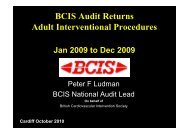Recommendations
ACC/AHA/SCAI PCI Guidelines - British Cardiovascular Intervention ...
ACC/AHA/SCAI PCI Guidelines - British Cardiovascular Intervention ...
- No tags were found...
You also want an ePaper? Increase the reach of your titles
YUMPU automatically turns print PDFs into web optimized ePapers that Google loves.
64<br />
Smith et al. 2005<br />
ACC/AHA/SCAI Practice Guidelines<br />
ACC - www.acc.org<br />
AHA - www.americanheart.org<br />
SCAI - www.scai.org<br />
Importantly, the CREDO trial did not have a control group<br />
that was given a loading dose at the time of the procedure.<br />
The effects of pretreatment with clopidogrel and aspirin<br />
followed by long-term therapy in patients undergoing PCI<br />
was also evaluated in the PCI CURE study (667). The PCI<br />
CURE study examined 2658 patients with non–ST-elevation<br />
acute coronary syndromes undergoing PCI assigned randomly<br />
to double-blind treatment with clopidogrel (n equals 1313)<br />
or placebo (n equals 1345). The patients were pretreated with<br />
aspirin and the study drug for 6 days before PCI during initial<br />
hospital admission and for 10 days overall. After PCI,<br />
80% of patients in both groups received open-label clopidogrel<br />
for 4 weeks, after which the study drug was restarted for<br />
a mean of 8 months. Fifty-nine patients (4.5% in the clopidogrel<br />
group) experienced the primary end point of cardiovascular<br />
death, MI, or urgent target-lesion revascularization<br />
within 30 days compared with 6.4% in the placebo group (P<br />
equals 0.03). Long-term clopidogrel administration after PCI<br />
conferred a lower rate of cardiovascular death, MI, or any<br />
revascularization (P equals 0.03) and cardiovascular death or<br />
MI (P equals 0.047). Including events before and after PCI,<br />
there was an overall reduction of 31% in cardiovascular<br />
death and MI (P equals 0.002).<br />
The use of clopidogrel in patients with diabetes had especially<br />
favorable results. The CAPRIE (Clopidogrel versus<br />
Aspirin in Patients at Risk of Ischemic Events) trial showed<br />
a 9% RRR that favored clopidogrel versus aspirin for cardiovascular<br />
events. A subgroup analysis in patients who had<br />
prior cardiac surgery and who had been randomized to clopidogrel<br />
revealed a significant reduction in risk of MI, stroke,<br />
and cardiovascular death compared with those taking aspirin.<br />
In patients with diabetes in the CAPRIE substudy, the benefit<br />
of clopidogrel appeared larger compared with aspirin<br />
alone, especially in those who required insulin (694).<br />
Tabulation of the number of adverse events prevented per<br />
1000 patients treated for 1 year with clopidogrel compared<br />
with aspirin revealed 9 events prevented in the patients without<br />
diabetes, with 21 events in all patients with diabetes and<br />
38 in insulin-requiring patients with diabetes.<br />
Further trials are needed to identify the optimum loading<br />
dose and timing of clopidogrel administration before PCI. A<br />
strategy of administering a 300-mg loading dose 6 h before<br />
PCI has the best established evidence of efficacy (666).<br />
Higher loading doses increase the magnitude and speed of<br />
inhibition of platelet aggregation; however, no large-scale<br />
randomized trials have been conducted to date comparing the<br />
efficacy and safety of different loading doses of clopidogrel.<br />
Furthermore, an important consideration in the decision for<br />
pretreatment is the increased risk of bleeding in patients<br />
managed with CABG. The ARMYDA-2 trial (Antiplatelet<br />
therapy for the Reduction of MYocardial Damage during<br />
Angioplasty) is a randomized, prospective, double-blind<br />
study of patients with stable angina or UA/NSTEMI and<br />
indications for coronary angiography. In this trial, 126<br />
patients were randomized to a 600-mg loading dose and 129<br />
patients to a 300-mg loading dose 4 to 8 h before PCI. The<br />
primary end point of death, MI (defined as CK-MB greater<br />
than 3 times the upper limit of normal), or target-vessel<br />
revascularization up to 30 days after the procedure occurred<br />
in 4% of patients in the 600-mg loading dose group and 12%<br />
in the 300-mg loading dose group (P equals 0.041) owing to<br />
a reduction in periprocedural MI. This was a small study of<br />
relatively low-risk patients, with only a few patients receiving<br />
IIb/IIIa inhibitors. Thus, whether the results would also<br />
apply to higher-risk patients taking IIb/IIIa blockers is<br />
unknown (695). Some insights may be derived from the<br />
CLEAR PLATELETS study (Clopidogrel Loading With<br />
Eptifibatide to Arrest the Reactivity of Platelets), which evaluated<br />
a 300-mg and 600-mg clopidogrel loading dose with or<br />
without eptifibatide in 120 patients undergoing elective<br />
stenting procedures. Clopidogrel was administered immediately<br />
after stenting. Aggregometry and flow cytometry were<br />
used to assess platelet reactivity. The authors concluded that<br />
a strategy of eptifibatide administration was associated with<br />
superior platelet inhibition and lower cardiac biomarker<br />
release than high-dose (600 mg) or standard-dose (300 mg)<br />
clopidogrel at the time of PCI (696). Further study is needed<br />
to determine the relationship of platelet reactivity to clinical<br />
outcomes such as bleeding, myocardial necrosis, and stent<br />
thrombosis, which could not be derived from this small,<br />
pharmacodynamic study.<br />
Continuation of combination treatment with aspirin and<br />
clopidogrel after PCI appears to reduce rates of cardiovascular<br />
ischemic events (666,667,697,698). On the basis of randomized<br />
clinical trial protocols, aspirin 325 mg daily should<br />
be given for at least 1 month after BMS implantation (unless<br />
there is a risk of bleeding, in which case it should be given<br />
for 2 weeks), 3 months after SES implantation, and 6 months<br />
after paclitaxel-eluting stent (PES) implantation, after which<br />
daily chronic aspirin should be continued indefinitely at a<br />
dose of 75 to 162 mg. Likewise, clopidogrel 75 mg daily<br />
should be given for at least 1 month after BMS implantation,<br />
3 months after SES implantation, and 6 months after PES<br />
implantation and ideally up to 12 months in patients who are<br />
not at high risk of bleeding. To reduce the incidence of bleeding<br />
complications associated with dual antiplatelet therapy,<br />
lower-dose aspirin (75 to 162 mg daily) is recommended for<br />
long-term therapy (665).<br />
6.2.2. Glycoprotein IIb/IIIa Inhibitors<br />
Class I<br />
In patients with UA/NSTEMI undergoing PCI without<br />
clopidogrel administration, a GP IIb/IIIa inhibitor<br />
(abciximab, eptifibatide, or tirofiban) should be<br />
administered. (Level of Evidence: A)*<br />
Class IIa<br />
1. In patients with UA/NSTEMI undergoing PCI with<br />
clopidogrel administration, it is reasonable to administer<br />
a GP IIb/IIIa inhibitor (abciximab, eptifibatide,<br />
or tirofiban). (Level of Evidence: B)*<br />
2. In patients with STEMI undergoing PCI, it is reasonable<br />
to administer abciximab as early as possible.


